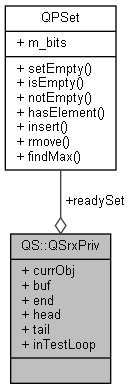Output signal dictionary record.
A signal dictionary record associates the numerical value of the signal and the binary address of the state machine that consumes that signal with the human-readable name of the signal.
Providing a signal dictionary QS record can vastly improve readability of the QS log, because instead of dealing with cryptic machine addresses the QSpy host utility can display human-readable names.
A signal dictionary entry is associated with both the signal value sig_ and the state machine obj_, because signals are required to be unique only within a given state machine and therefore the same numerical values can represent different signals in different state machines.
For the "global" signals that have the same meaning in all state machines (such as globally published signals), you can specify a signal dictionary entry with the obj_ parameter set to NULL.
The following example shows the definition of signal dictionary entries in the initial transition of the Table active object. Please note that signals HUNGRY_SIG and DONE_SIG are associated with the Table state machine only ("me" obj_ pointer). The EAT_SIG signal, on the other hand, is global (0 obj_ pointer):
static Table l_table;
(void)e;
. . .
}
static QState top(void *const me, QEvt const *const e) noexcept
the top-state.
std::uint_fast8_t QState
Type returned from state-handler functions.
#define QS_OBJ_DICTIONARY(obj_)
Output object dictionary record.
#define QS_FUN_DICTIONARY(fun_)
Output function dictionary record.
#define QS_SIG_DICTIONARY(sig_, obj_)
Output signal dictionary record.
- Note
- The QSpy log utility must capture the signal dictionary record in order to use the human-readable information. You need to connect to the target before the dictionary entries have been transmitted.
The following QSpy log example shows the signal dictionary records generated from the Table initial transition and subsequent records that show human-readable names of the signals:
qspy -fqs.bin -S2 -Q2 -P4 -p4 -T4
QSpy 4.0.00
Thu Apr 06 09:56:10 2005
-f qs.bin
-S 2
-Q 2
-P 4
-p 4
-T 4
. . . . . .
Obj Dic: 00419048->table
EQ.INIT: Obj=00419050 Len= 5
0000000000 AO.ADD : Active=table Prio=51
Fun Dic: 00401CEE->Table_serving
Sig Dic: 00000004,Obj=00419048 ->HUNGRY_SIG
Sig Dic: 00000005,Obj=00419048 ->DONE_SIG
Sig Dic: 00000006,Obj=00000000 ->EAT_SIG
0000000000 AO.SUB : Active=table Sig=HUNGRY_SIG
0000000000 AO.SUB : Active=table Sig=DONE_SIG
0000000000 AO.SUB : Active=table Sig=00000007,Obj=00419048
Q_INIT : Obj=table Source=00403CE0 Target=Table_serving
0000000000 ==>Init: Obj=table New=Table_serving
. . . . . .
0000000007 AO.FIFO: Obj=table Evt(Sig=HUNGRY_SIG, Pool=1, Ref= 1)
Queue(nUsed= 0, nMax= 0)
0000000007 AO.FIFO: Obj=table Evt(Sig=HUNGRY_SIG, Pool=1, Ref= 1)
Queue(nUsed= 0, nMax= 0)
0000000007 AO.FIFO: Obj=table Evt(Sig=HUNGRY_SIG, Pool=1, Ref= 1)
Queue(nUsed= 1, nMax= 1)
0000000007 AO.FIFO: Obj=table Evt(Sig=HUNGRY_SIG, Pool=1, Ref= 1)
Queue(nUsed= 2, nMax= 2)
Q_ENTRY: Obj=philo[2] State=Philosopher_hungry
0000000007 AO.GET : Active= table Evt(Sig=HUNGRY_SIG, Pool=1, Ref= 1)
Queue(nUsed= 2)
0000000007 AO.FIFO: Obj=table Evt(Sig=HUNGRY_SIG, Pool=1, Ref= 1)
Queue(nUsed= 2, nMax= 3)
Q_ENTRY: Obj=philo[4] State=Philosopher_hungry
Q_ENTRY: Obj=philo[1] State=Philosopher_hungry
Q_ENTRY: Obj=philo[3] State=Philosopher_hungry
0000000007 ==>Tran: Obj=philo[2] Sig=TIMEOUT_SIG Source=Philosopher_thinking
New=Philosopher_hungry
0000000007 ==>Tran: Obj=philo[4] Sig=TIMEOUT_SIG Source=Philosopher_thinking
New=Philosopher_hungry
0000000007 ==>Tran: Obj=philo[3] Sig=TIMEOUT_SIG Source=Philosopher_thinking
New=Philosopher_hungry
0000000007 ==>Tran: Obj=philo[1] Sig=TIMEOUT_SIG Source=Philosopher_thinking
New=Philosopher_hungry
Q_ENTRY: Obj=philo[0] State=Philosopher_hungry
0000000007 ==>Tran: Obj=philo[0] Sig=TIMEOUT_SIG Source=Philosopher_thinking
New=Philosopher_hungry
0000000007 User070: 2 hungry
0000000007 NEW : Evt(Sig=EAT_SIG, size= 6)
0000000007 MP.GET : Obj=00418E18 nFree= 5 nMin= 5
0000000007 AO.FIFO: Obj=philo[4] Evt(Sig=EAT_SIG, Pool=1, Ref= 0)
Queue(nUsed= 0, nMax= 0)
0000000007 AO.FIFO: Obj=philo[3] Evt(Sig=EAT_SIG, Pool=1, Ref= 0)
Queue(nUsed= 0, nMax= 0)
0000000007 AO.FIFO: Obj=philo[2] Evt(Sig=EAT_SIG, Pool=1, Ref= 0)
Queue(nUsed= 0, nMax= 0)
0000000007 AO.FIFO: Obj=philo[1] Evt(Sig=EAT_SIG, Pool=1, Ref= 0)
Queue(nUsed= 0, nMax= 0)
0000000007 AO.FIFO: Obj=philo[0] Evt(Sig=EAT_SIG, Pool=1, Ref= 0)
Queue(nUsed= 0, nMax= 0)
0000000007
PUBLISH: Evt(Sig=EAT_SIG, Pool=1, Ref= 5) nSubsr= 5
0000000007 AO.GETL: Active= philo[4] Evt(Sig=EAT_SIG, Pool=1, Ref= 5)
0000000007 AO.GETL: Active= philo[2] Evt(Sig=EAT_SIG, Pool=1, Ref= 5)
0000000007 AO.GETL: Active= philo[3] Evt(Sig=EAT_SIG, Pool=1, Ref= 5)
0000000007 AO.GETL: Active= philo[1] Evt(Sig=EAT_SIG, Pool=1, Ref= 5)
0000000007 AO.GETL: Active= philo[0] Evt(Sig=EAT_SIG, Pool=1, Ref= 5)
. . . . . .
#define PUBLISH(e_, sender_)
Invoke the event publishing facility QP::QF::publish_(). This macro.
The following QSpy log example shows the same sequence of records, but with dictionary records removed. The human-readable signal names are not available.
qspy -fqs0.bin -S2 -Q2 -P4 -p4 -T4
QSpy 4.0.00
Thu Apr 06 10:10:22 2005
-f qs0.bin
-S 2
-Q 2
-P 4
-p 4
-T 4
. . . . . .
Obj Dic: 00419048->table
EQ.INIT: Obj=00419050 Len= 5
0000000000 AO.ADD : Active=table Prio=51
*** Dropped 4 records
0000000000 AO.SUB : Active=table Sig=00000004,Obj=00419048
0000000000 AO.SUB : Active=table Sig=00000005,Obj=00419048
0000000000 AO.SUB : Active=table Sig=00000007,Obj=00419048
Q_INIT : Obj=table Source=00403CE0 Target=00403CE0
0000000000 ==>Init: Obj=table New=00401CEE
. . . . . .
0000000007 AO.FIFO: Obj=table Evt(Sig=00000004,Obj=00419048, Pool=1, Ref= 1)
Queue(nUsed= 0, nMax= 0)
0000000007 AO.FIFO: Obj=table Evt(Sig=00000004,Obj=00419048, Pool=1, Ref= 1)
Queue(nUsed= 0, nMax= 0)
0000000007 AO.FIFO: Obj=table Evt(Sig=00000004,Obj=00419048, Pool=1, Ref= 1)
Queue(nUsed= 1, nMax= 1)
0000000007 AO.FIFO: Obj=table Evt(Sig=00000004,Obj=00419048, Pool=1, Ref= 1)
Queue(nUsed= 2, nMax= 2)
Q_ENTRY: Obj=philo[2] State=Philosopher_hungry
0000000007 AO.GET : Active= table Evt(Sig=00000004,Obj=00419048, Pool=1, Ref= 1)
Queue(nUsed= 2)
0000000007 AO.FIFO: Obj=table Evt(Sig=00000004,Obj=00419048, Pool=1, Ref= 1)
Queue(nUsed= 2, nMax= 3)
Q_ENTRY: Obj=philo[4] State=Philosopher_hungry
Q_ENTRY: Obj=philo[1] State=Philosopher_hungry
Q_ENTRY: Obj=philo[3] State=Philosopher_hungry
0000000007 ==>Tran: Obj=philo[2] Sig=TIMEOUT_SIG Source=Philosopher_thinking
New=Philosopher_hungry
0000000007 ==>Tran: Obj=philo[4] Sig=TIMEOUT_SIG Source=Philosopher_thinking
New=Philosopher_hungry
0000000007 ==>Tran: Obj=philo[3] Sig=TIMEOUT_SIG Source=Philosopher_thinking
New=Philosopher_hungry
0000000007 ==>Tran: Obj=philo[1] Sig=TIMEOUT_SIG Source=Philosopher_thinking
New=Philosopher_hungry
Q_ENTRY: Obj=philo[0] State=Philosopher_hungry
0000000007 ==>Tran: Obj=philo[0] Sig=TIMEOUT_SIG Source=Philosopher_thinking
New=Philosopher_hungry
0000000007 User070: 2 hungry
0000000007 NEW : Evt(Sig=00000006,Obj=00000000, size= 6)
0000000007 MP.GET : Obj=00418E18 nFree= 5 nMin= 5
0000000007 AO.FIFO: Obj=philo[4] Evt(Sig=00000006,Obj=00419000, Pool=1, Ref= 0)
Queue(nUsed= 0, nMax= 0)
0000000007 AO.FIFO: Obj=philo[3] Evt(Sig=00000006,Obj=00418FBC, Pool=1, Ref= 0)
Queue(nUsed= 0, nMax= 0)
0000000007 AO.FIFO: Obj=philo[2] Evt(Sig=00000006,Obj=00418F78, Pool=1, Ref= 0)
Queue(nUsed= 0, nMax= 0)
0000000007 AO.FIFO: Obj=philo[1] Evt(Sig=00000006,Obj=00418F34, Pool=1, Ref= 0)
Queue(nUsed= 0, nMax= 0)
0000000007 AO.FIFO: Obj=philo[0] Evt(Sig=00000006,Obj=00418EF0, Pool=1, Ref= 0)
Queue(nUsed= 0, nMax= 0)
0000000007
PUBLISH: Evt(Sig=00000006,Obj=00000000, Pool=1, Ref= 5) nSubsr= 5
0000000007 AO.GETL: Active= philo[4] Evt(Sig=00000006,Obj=00419000, Pool=1, Ref= 5)
0000000007 AO.GETL: Active= philo[2] Evt(Sig=00000006,Obj=00418F78, Pool=1, Ref= 5)
0000000007 AO.GETL: Active= philo[3] Evt(Sig=00000006,Obj=00418FBC, Pool=1, Ref= 5)
0000000007 AO.GETL: Active= philo[1] Evt(Sig=00000006,Obj=00418F34, Pool=1, Ref= 5)
0000000007 AO.GETL: Active= philo[0] Evt(Sig=00000006,Obj=00418EF0, Pool=1, Ref= 5)
. . . . . .
Definition at line 983 of file qs.hpp.

